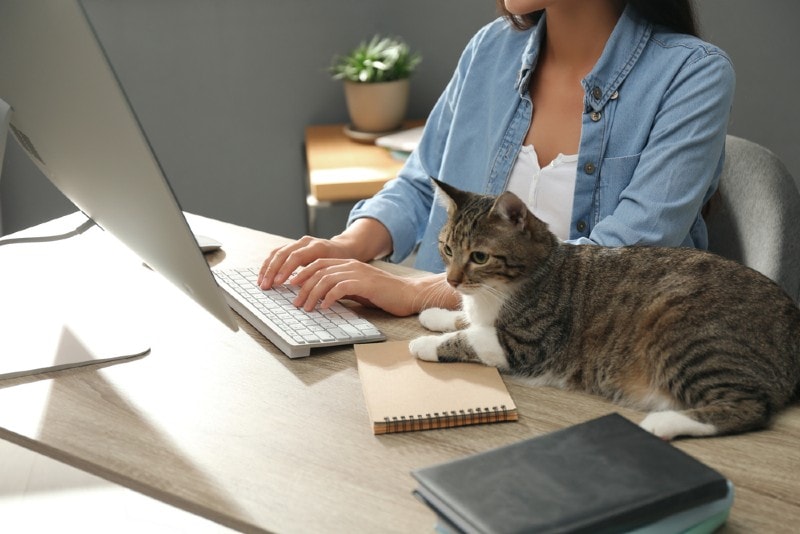
It wasn’t that long ago when the concept of sharing your workplace with an animal was entirely unheard of. The workplace was for just that—work. Thankfully, the modern workplace is ever-changing and much less rigid than it used to be in generations past. As a result, it’s becoming increasingly popular in our modern world for employees to bring their pets to work. And you might be surprised to learn that 94% of people support having pets in the workplace.1
While it’s primarily dogs that tag along with their humans to work, some workplaces allow cats and other pets, too. What possible benefits could there be to bringing animals into a work environment, though? As it turns out, lots! Keep reading to discover how sharing your office with cats can lower your stress levels and make you a better employee.
Are Office Pets Really a “Thing”?
Absolutely! Many offices worldwide allow their employees to bring their beloved pets to work. Large corporations like Amazon and Google have allowed their employees to bring their pets to work for years now.
Google had its first doggy visitor in 1999 and has become more accommodating to its employees’ pets. The corporation allows dogs at all its offices and has a dog park on one campus. There are also puppy therapy programs that take place in several Google offices.
Amazon is one of the most dog-friendly companies in America. On any given day in the corporation’s Seattle headquarters, you can find as many as 7,000 dogs working alongside their owners. The company has been dog-friendly since day one, and, like Google, one of its buildings has a doggie deck complete with a faux fire hydrant.
While dogs may be the most common pet in the workplace, it is not impossible to find other pet-friendly offices.
Ferray, an IT firm based in Tokyo, has had a revolving roster of office cats since 2000. There are around nine cats currently living at the office during the day. The company also provides a stipend to employees that adopt shelter cats and bring them to work.
Pasona Group, a staffing agency in Tokyo, recruited two grass-loving four-legged employees in 2011. The goats live on the 13th floor of the Pasona HQ, a floor converted to a ranch that employees can visit on their breaks.

What Are The Benefits of Working Alongside Cats?
There are several science-backed benefits of working alongside animals, namely increased productivity levels and stress relief.
Productivity
Pets in the office can make work more enjoyable and improve professional satisfaction. This ultimately reduces absenteeism, improving productivity and work output. Employees who are happier with their position at work will put in greater effort and be less likely to quit.
Stress Relief
Perhaps the most alluring reason to bring your kitty to work with you is that they can help relieve stress.
A study from 2020 found that companion animals act as social buffers for psychological distress and loneliness. In addition, pets can mitigate stress responses and increase resilience, which can come in handy in the workplace.
Even doing something as simple as petting a cat or dog can relieve stress. I can’t think of a better way to bring yourself down after a taxing meeting or phone call than snuggling up with your kitty and giving it some well-deserved pets.
And you’ll reap even more benefits when your kitty is so content it starts purring. A cat’s purr is within 20–140 Hz, a range known to be medically therapeutic for illnesses in humans. In addition, a purr can calm your nerves and lower blood pressure.
Does Everyone Support Cats in the Workplace?
Sadly, no.
A survey performed by LiveCareer found that while 8 of 10 respondents said working alongside a pet was positive, 6% of the older respondents found the experience negative. This isn’t surprising, considering over half of the Millennial employees would consider a career change if it meant they could bring their pets to work, and 44% look at their pets as “starter children.” The Millennial generation, one I am proudly a part of, is much fonder of their pets than previous generations. We can’t blame the Boomers, though; they came from an era where dogs and cats were expected to sleep outside, not beside their owners in a warm bed.
Of course, people with allergies might also object to the idea of a pet-friendly workplace. Cat allergies are the world’s second most likely cause of indoor respiratory allergies, with up to 20% of adults being allergic to them. While one might argue that keeping the cat separate from the person with the allergies would suffice, shared airflow, even behind closed doors, can undoubtedly trigger an allergic reaction.
People with gatophobia or ailurophobia (the fear of cats) will also not enjoy sharing their office with a feline officemate. Someone with a phobia of cats may have panic and anxiety knowing there is a cat nearby.
Pets can cause property damage if they have an accident on the floor or scratch up the furniture. They can also be a liability nightmare if they were to scratch or bite an employee or customer.
Not to mention, a kitty stepping all over your keyboard, prematurely sending emails, or deleting the report you’ve been working on all day can be highly distracting and annoying.

My Experience Working Alongside Cats
I’m a work-from-home writer with six cats, so I can confidently weigh in on how working alongside cats affects me personally.
Having my cats nearby always helps with my stress levels, whether I’m working or not. I love it when my cat jumps on my lap and curls up for a nap. There’s something so comfortable about having them there, and I think it might have something to do with deep pressure therapy (DPT).
DPT uses pressure to relax the nervous system by modeling the experience of being held. Service dogs can be trained to perform DPT on their owners, so I don’t see why the same rule can’t apply to cats. They may not be able to do it on command like a service dog, but I imagine the added weight of a kitty on your lap still taps into the benefits of DPT.
Cats are pretty self-sustainable throughout the day, so they don’t come to bug me for potty breaks like a dog might, so they’re less distracting.
It’s not always sunshine and rainbows working alongside my cats, though. Sharing a house with six kitties can sometimes get hectic, as I’m sure you can imagine. They don’t always get along, and there are times the fighting and zoomies are distracting.
Final Thoughts
Sharing an office with cats can provide many benefits to employees, namely, stress relief and happiness. This then results in increased productivity and work output, benefiting the employer. But unfortunately, not everyone will enjoy having a cat in the office, so it might be realistic for every workplace.
Featured Image Credit: New Africa, Shutterstock
Cat mom to Ivy – a feisty little rescue kitten that is her one and only child. For now! Throughout her life, she has been introduced to the special love that can be found in the bond with a cat. Having owned multiple felines, she is more than certain that their love is unmatched, unconditional and unlike any other. With a passion to educate the public about everything, there is to know about felines, their behavior, and their unique personalities, Crystal is devoted to making sure that all cats and their owners know the importance of conscious living – and loving!
Credit : Source Post






